An Analysis of Leadership, Employee PsyCap, and Performance (MGMT201)
VerifiedAdded on 2022/09/30
|8
|2371
|22
Essay
AI Summary
This essay delves into the intricate relationship between authentic leadership, Leader-Member Exchange (LMX), and employee psychological capital (PsyCap), exploring their combined impact on employee performance and organizational success. It examines how authentic leaders foster trust and positive psychological capital within their workforce, leading to increased employee engagement and productivity. The essay analyzes the different types of employees (professional, administrative, emotional labor, etc.) and how their PsyCap can be built. It also explores the role of emotions in leadership and their significant impact on employee performance, examining emotional intelligence and its influence on team building and overall organizational outcomes. The paper highlights the importance of authentic leadership practices, leader-member exchange, and the positive effects of psychological capital on employee behavior and attitudes, providing a comprehensive overview of these critical leadership concepts.
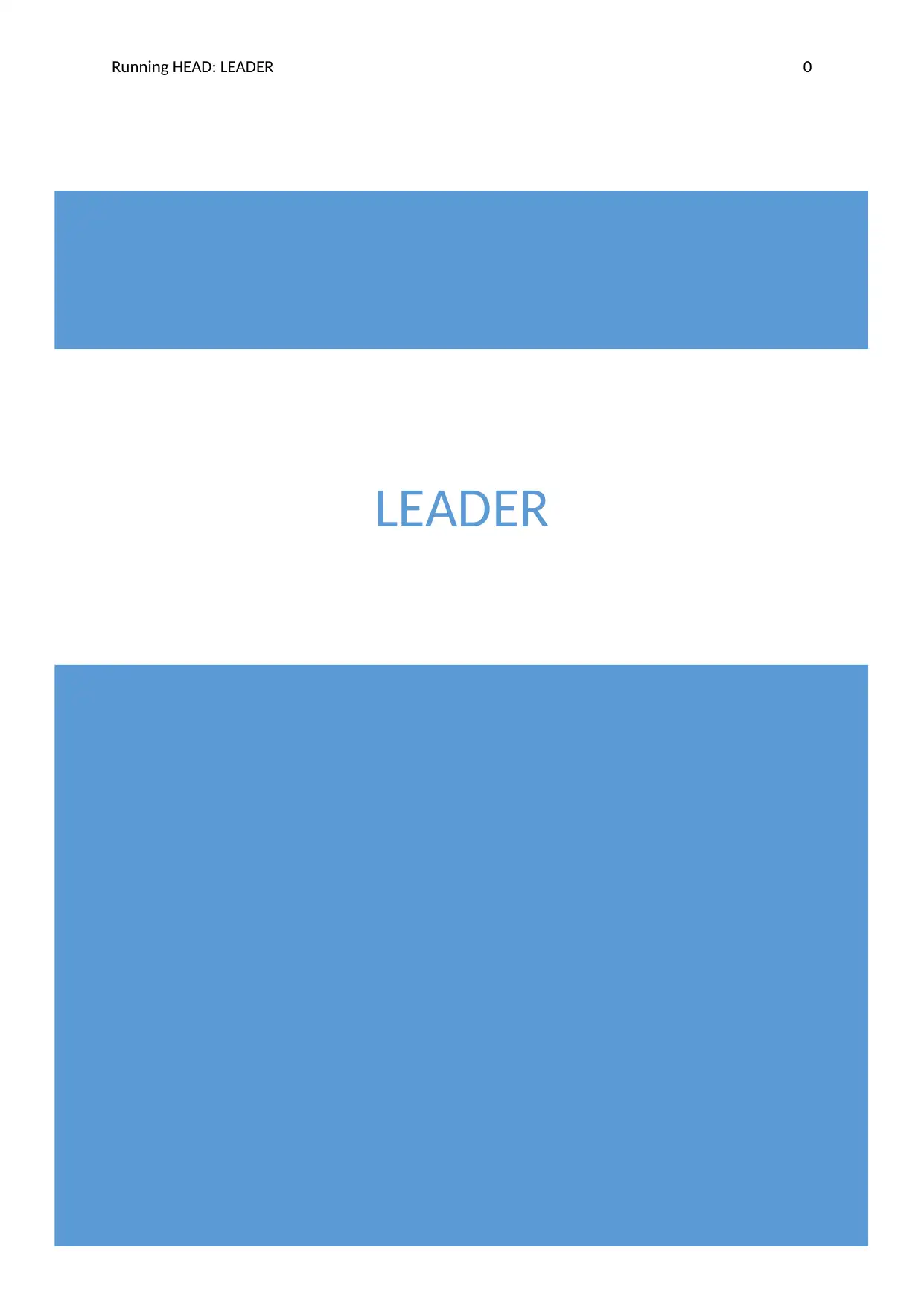
LEADER
Running HEAD: LEADER 0
Running HEAD: LEADER 0
Paraphrase This Document
Need a fresh take? Get an instant paraphrase of this document with our AI Paraphraser
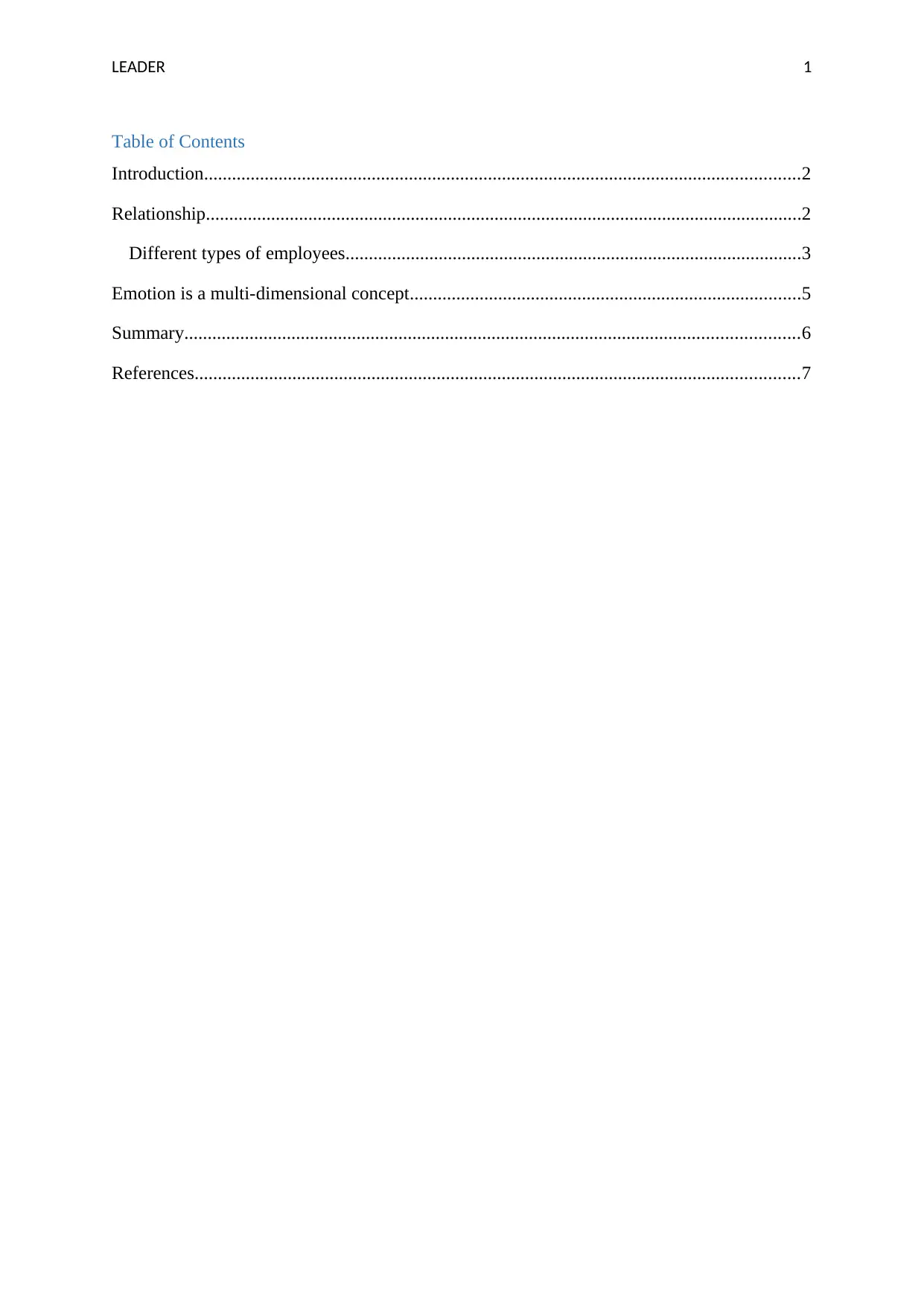
LEADER 1
Table of Contents
Introduction................................................................................................................................2
Relationship................................................................................................................................2
Different types of employees..................................................................................................3
Emotion is a multi-dimensional concept....................................................................................5
Summary....................................................................................................................................6
References..................................................................................................................................7
Table of Contents
Introduction................................................................................................................................2
Relationship................................................................................................................................2
Different types of employees..................................................................................................3
Emotion is a multi-dimensional concept....................................................................................5
Summary....................................................................................................................................6
References..................................................................................................................................7
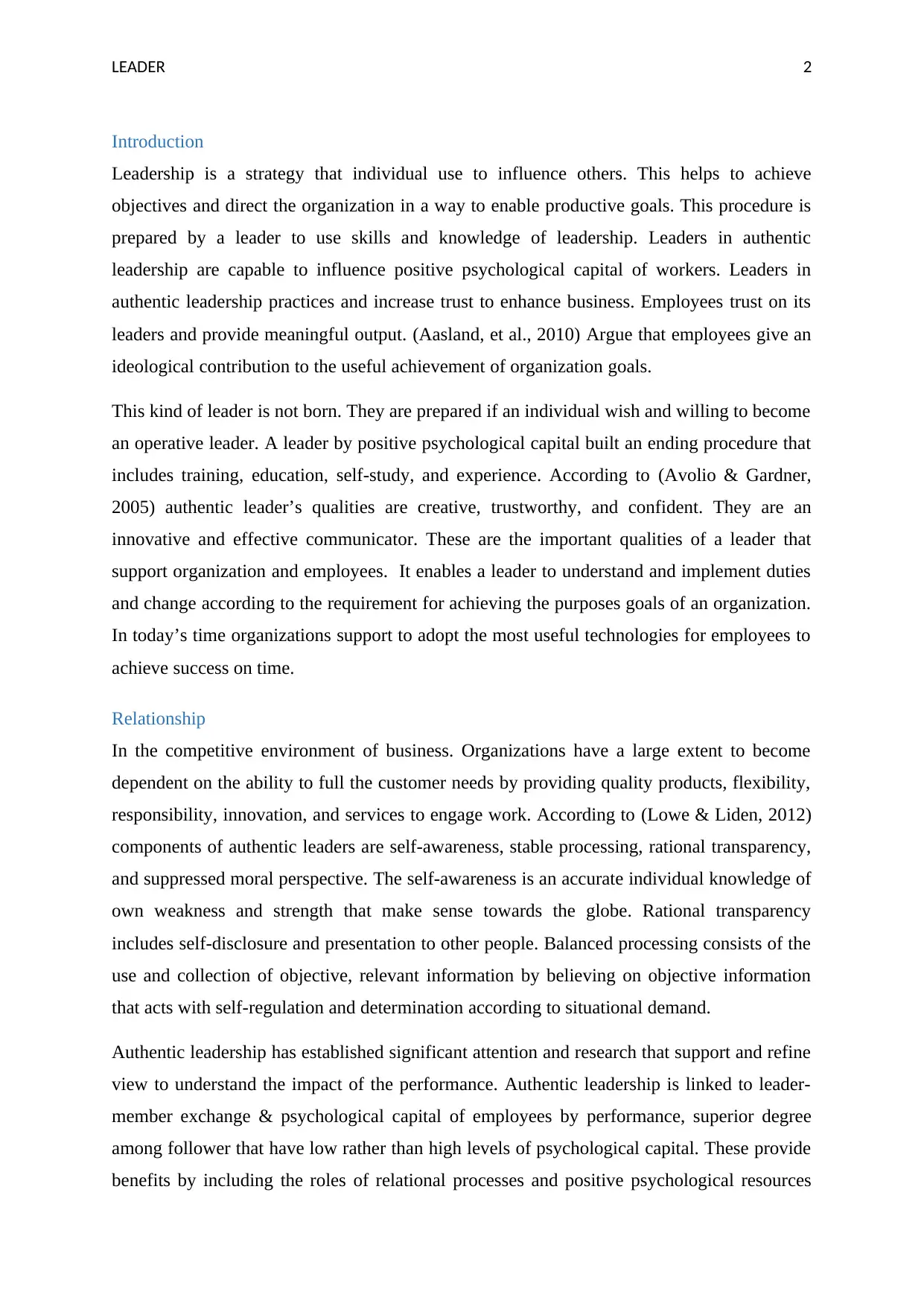
LEADER 2
Introduction
Leadership is a strategy that individual use to influence others. This helps to achieve
objectives and direct the organization in a way to enable productive goals. This procedure is
prepared by a leader to use skills and knowledge of leadership. Leaders in authentic
leadership are capable to influence positive psychological capital of workers. Leaders in
authentic leadership practices and increase trust to enhance business. Employees trust on its
leaders and provide meaningful output. (Aasland, et al., 2010) Argue that employees give an
ideological contribution to the useful achievement of organization goals.
This kind of leader is not born. They are prepared if an individual wish and willing to become
an operative leader. A leader by positive psychological capital built an ending procedure that
includes training, education, self-study, and experience. According to (Avolio & Gardner,
2005) authentic leader’s qualities are creative, trustworthy, and confident. They are an
innovative and effective communicator. These are the important qualities of a leader that
support organization and employees. It enables a leader to understand and implement duties
and change according to the requirement for achieving the purposes goals of an organization.
In today’s time organizations support to adopt the most useful technologies for employees to
achieve success on time.
Relationship
In the competitive environment of business. Organizations have a large extent to become
dependent on the ability to full the customer needs by providing quality products, flexibility,
responsibility, innovation, and services to engage work. According to (Lowe & Liden, 2012)
components of authentic leaders are self-awareness, stable processing, rational transparency,
and suppressed moral perspective. The self-awareness is an accurate individual knowledge of
own weakness and strength that make sense towards the globe. Rational transparency
includes self-disclosure and presentation to other people. Balanced processing consists of the
use and collection of objective, relevant information by believing on objective information
that acts with self-regulation and determination according to situational demand.
Authentic leadership has established significant attention and research that support and refine
view to understand the impact of the performance. Authentic leadership is linked to leader-
member exchange & psychological capital of employees by performance, superior degree
among follower that have low rather than high levels of psychological capital. These provide
benefits by including the roles of relational processes and positive psychological resources
Introduction
Leadership is a strategy that individual use to influence others. This helps to achieve
objectives and direct the organization in a way to enable productive goals. This procedure is
prepared by a leader to use skills and knowledge of leadership. Leaders in authentic
leadership are capable to influence positive psychological capital of workers. Leaders in
authentic leadership practices and increase trust to enhance business. Employees trust on its
leaders and provide meaningful output. (Aasland, et al., 2010) Argue that employees give an
ideological contribution to the useful achievement of organization goals.
This kind of leader is not born. They are prepared if an individual wish and willing to become
an operative leader. A leader by positive psychological capital built an ending procedure that
includes training, education, self-study, and experience. According to (Avolio & Gardner,
2005) authentic leader’s qualities are creative, trustworthy, and confident. They are an
innovative and effective communicator. These are the important qualities of a leader that
support organization and employees. It enables a leader to understand and implement duties
and change according to the requirement for achieving the purposes goals of an organization.
In today’s time organizations support to adopt the most useful technologies for employees to
achieve success on time.
Relationship
In the competitive environment of business. Organizations have a large extent to become
dependent on the ability to full the customer needs by providing quality products, flexibility,
responsibility, innovation, and services to engage work. According to (Lowe & Liden, 2012)
components of authentic leaders are self-awareness, stable processing, rational transparency,
and suppressed moral perspective. The self-awareness is an accurate individual knowledge of
own weakness and strength that make sense towards the globe. Rational transparency
includes self-disclosure and presentation to other people. Balanced processing consists of the
use and collection of objective, relevant information by believing on objective information
that acts with self-regulation and determination according to situational demand.
Authentic leadership has established significant attention and research that support and refine
view to understand the impact of the performance. Authentic leadership is linked to leader-
member exchange & psychological capital of employees by performance, superior degree
among follower that have low rather than high levels of psychological capital. These provide
benefits by including the roles of relational processes and positive psychological resources
⊘ This is a preview!⊘
Do you want full access?
Subscribe today to unlock all pages.

Trusted by 1+ million students worldwide
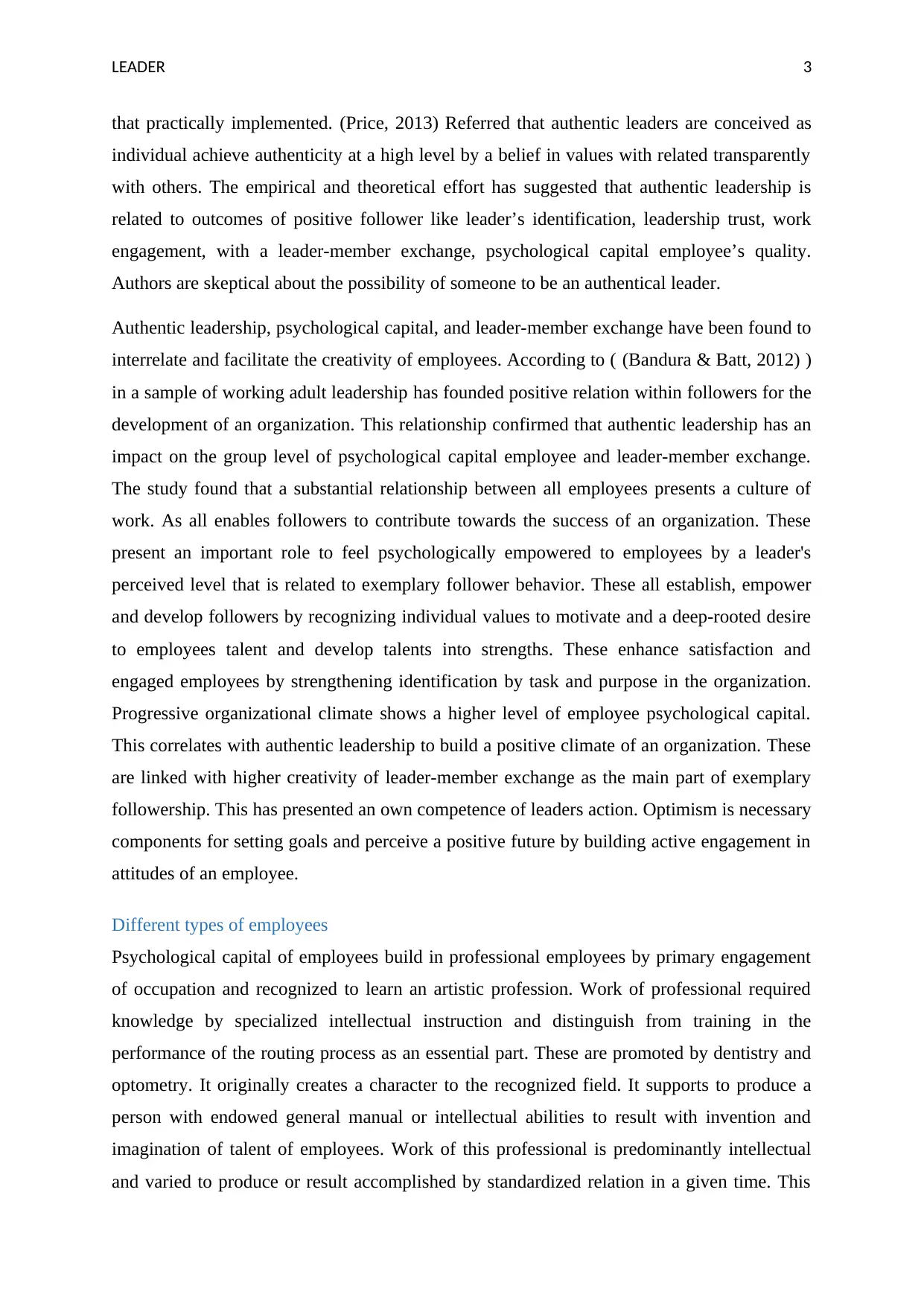
LEADER 3
that practically implemented. (Price, 2013) Referred that authentic leaders are conceived as
individual achieve authenticity at a high level by a belief in values with related transparently
with others. The empirical and theoretical effort has suggested that authentic leadership is
related to outcomes of positive follower like leader’s identification, leadership trust, work
engagement, with a leader-member exchange, psychological capital employee’s quality.
Authors are skeptical about the possibility of someone to be an authentical leader.
Authentic leadership, psychological capital, and leader-member exchange have been found to
interrelate and facilitate the creativity of employees. According to ( (Bandura & Batt, 2012) )
in a sample of working adult leadership has founded positive relation within followers for the
development of an organization. This relationship confirmed that authentic leadership has an
impact on the group level of psychological capital employee and leader-member exchange.
The study found that a substantial relationship between all employees presents a culture of
work. As all enables followers to contribute towards the success of an organization. These
present an important role to feel psychologically empowered to employees by a leader's
perceived level that is related to exemplary follower behavior. These all establish, empower
and develop followers by recognizing individual values to motivate and a deep-rooted desire
to employees talent and develop talents into strengths. These enhance satisfaction and
engaged employees by strengthening identification by task and purpose in the organization.
Progressive organizational climate shows a higher level of employee psychological capital.
This correlates with authentic leadership to build a positive climate of an organization. These
are linked with higher creativity of leader-member exchange as the main part of exemplary
followership. This has presented an own competence of leaders action. Optimism is necessary
components for setting goals and perceive a positive future by building active engagement in
attitudes of an employee.
Different types of employees
Psychological capital of employees build in professional employees by primary engagement
of occupation and recognized to learn an artistic profession. Work of professional required
knowledge by specialized intellectual instruction and distinguish from training in the
performance of the routing process as an essential part. These are promoted by dentistry and
optometry. It originally creates a character to the recognized field. It supports to produce a
person with endowed general manual or intellectual abilities to result with invention and
imagination of talent of employees. Work of this professional is predominantly intellectual
and varied to produce or result accomplished by standardized relation in a given time. This
that practically implemented. (Price, 2013) Referred that authentic leaders are conceived as
individual achieve authenticity at a high level by a belief in values with related transparently
with others. The empirical and theoretical effort has suggested that authentic leadership is
related to outcomes of positive follower like leader’s identification, leadership trust, work
engagement, with a leader-member exchange, psychological capital employee’s quality.
Authors are skeptical about the possibility of someone to be an authentical leader.
Authentic leadership, psychological capital, and leader-member exchange have been found to
interrelate and facilitate the creativity of employees. According to ( (Bandura & Batt, 2012) )
in a sample of working adult leadership has founded positive relation within followers for the
development of an organization. This relationship confirmed that authentic leadership has an
impact on the group level of psychological capital employee and leader-member exchange.
The study found that a substantial relationship between all employees presents a culture of
work. As all enables followers to contribute towards the success of an organization. These
present an important role to feel psychologically empowered to employees by a leader's
perceived level that is related to exemplary follower behavior. These all establish, empower
and develop followers by recognizing individual values to motivate and a deep-rooted desire
to employees talent and develop talents into strengths. These enhance satisfaction and
engaged employees by strengthening identification by task and purpose in the organization.
Progressive organizational climate shows a higher level of employee psychological capital.
This correlates with authentic leadership to build a positive climate of an organization. These
are linked with higher creativity of leader-member exchange as the main part of exemplary
followership. This has presented an own competence of leaders action. Optimism is necessary
components for setting goals and perceive a positive future by building active engagement in
attitudes of an employee.
Different types of employees
Psychological capital of employees build in professional employees by primary engagement
of occupation and recognized to learn an artistic profession. Work of professional required
knowledge by specialized intellectual instruction and distinguish from training in the
performance of the routing process as an essential part. These are promoted by dentistry and
optometry. It originally creates a character to the recognized field. It supports to produce a
person with endowed general manual or intellectual abilities to result with invention and
imagination of talent of employees. Work of this professional is predominantly intellectual
and varied to produce or result accomplished by standardized relation in a given time. This
Paraphrase This Document
Need a fresh take? Get an instant paraphrase of this document with our AI Paraphraser
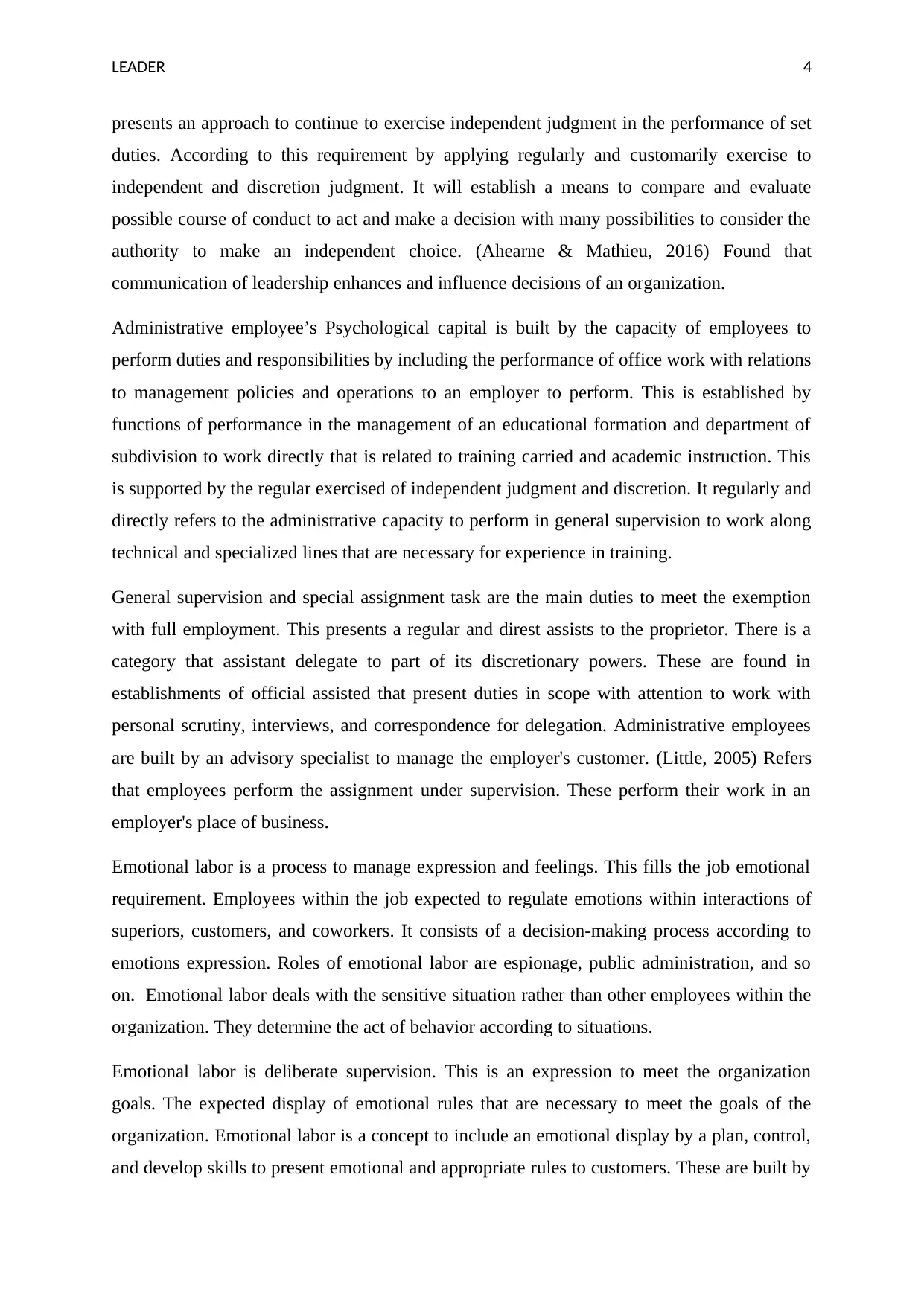
LEADER 4
presents an approach to continue to exercise independent judgment in the performance of set
duties. According to this requirement by applying regularly and customarily exercise to
independent and discretion judgment. It will establish a means to compare and evaluate
possible course of conduct to act and make a decision with many possibilities to consider the
authority to make an independent choice. (Ahearne & Mathieu, 2016) Found that
communication of leadership enhances and influence decisions of an organization.
Administrative employee’s Psychological capital is built by the capacity of employees to
perform duties and responsibilities by including the performance of office work with relations
to management policies and operations to an employer to perform. This is established by
functions of performance in the management of an educational formation and department of
subdivision to work directly that is related to training carried and academic instruction. This
is supported by the regular exercised of independent judgment and discretion. It regularly and
directly refers to the administrative capacity to perform in general supervision to work along
technical and specialized lines that are necessary for experience in training.
General supervision and special assignment task are the main duties to meet the exemption
with full employment. This presents a regular and direst assists to the proprietor. There is a
category that assistant delegate to part of its discretionary powers. These are found in
establishments of official assisted that present duties in scope with attention to work with
personal scrutiny, interviews, and correspondence for delegation. Administrative employees
are built by an advisory specialist to manage the employer's customer. (Little, 2005) Refers
that employees perform the assignment under supervision. These perform their work in an
employer's place of business.
Emotional labor is a process to manage expression and feelings. This fills the job emotional
requirement. Employees within the job expected to regulate emotions within interactions of
superiors, customers, and coworkers. It consists of a decision-making process according to
emotions expression. Roles of emotional labor are espionage, public administration, and so
on. Emotional labor deals with the sensitive situation rather than other employees within the
organization. They determine the act of behavior according to situations.
Emotional labor is deliberate supervision. This is an expression to meet the organization
goals. The expected display of emotional rules that are necessary to meet the goals of the
organization. Emotional labor is a concept to include an emotional display by a plan, control,
and develop skills to present emotional and appropriate rules to customers. These are built by
presents an approach to continue to exercise independent judgment in the performance of set
duties. According to this requirement by applying regularly and customarily exercise to
independent and discretion judgment. It will establish a means to compare and evaluate
possible course of conduct to act and make a decision with many possibilities to consider the
authority to make an independent choice. (Ahearne & Mathieu, 2016) Found that
communication of leadership enhances and influence decisions of an organization.
Administrative employee’s Psychological capital is built by the capacity of employees to
perform duties and responsibilities by including the performance of office work with relations
to management policies and operations to an employer to perform. This is established by
functions of performance in the management of an educational formation and department of
subdivision to work directly that is related to training carried and academic instruction. This
is supported by the regular exercised of independent judgment and discretion. It regularly and
directly refers to the administrative capacity to perform in general supervision to work along
technical and specialized lines that are necessary for experience in training.
General supervision and special assignment task are the main duties to meet the exemption
with full employment. This presents a regular and direst assists to the proprietor. There is a
category that assistant delegate to part of its discretionary powers. These are found in
establishments of official assisted that present duties in scope with attention to work with
personal scrutiny, interviews, and correspondence for delegation. Administrative employees
are built by an advisory specialist to manage the employer's customer. (Little, 2005) Refers
that employees perform the assignment under supervision. These perform their work in an
employer's place of business.
Emotional labor is a process to manage expression and feelings. This fills the job emotional
requirement. Employees within the job expected to regulate emotions within interactions of
superiors, customers, and coworkers. It consists of a decision-making process according to
emotions expression. Roles of emotional labor are espionage, public administration, and so
on. Emotional labor deals with the sensitive situation rather than other employees within the
organization. They determine the act of behavior according to situations.
Emotional labor is deliberate supervision. This is an expression to meet the organization
goals. The expected display of emotional rules that are necessary to meet the goals of the
organization. Emotional labor is a concept to include an emotional display by a plan, control,
and develop skills to present emotional and appropriate rules to customers. These are built by
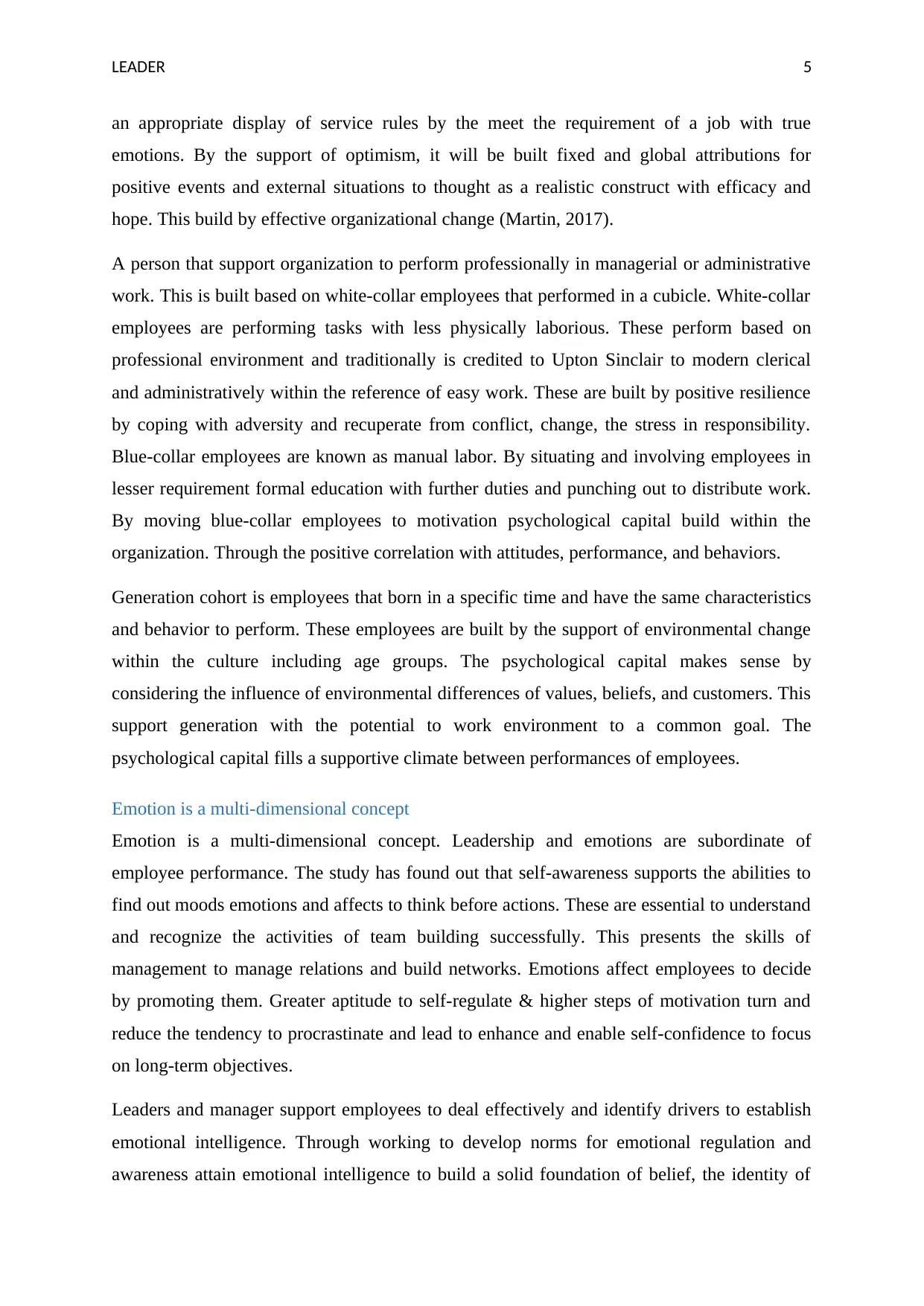
LEADER 5
an appropriate display of service rules by the meet the requirement of a job with true
emotions. By the support of optimism, it will be built fixed and global attributions for
positive events and external situations to thought as a realistic construct with efficacy and
hope. This build by effective organizational change (Martin, 2017).
A person that support organization to perform professionally in managerial or administrative
work. This is built based on white-collar employees that performed in a cubicle. White-collar
employees are performing tasks with less physically laborious. These perform based on
professional environment and traditionally is credited to Upton Sinclair to modern clerical
and administratively within the reference of easy work. These are built by positive resilience
by coping with adversity and recuperate from conflict, change, the stress in responsibility.
Blue-collar employees are known as manual labor. By situating and involving employees in
lesser requirement formal education with further duties and punching out to distribute work.
By moving blue-collar employees to motivation psychological capital build within the
organization. Through the positive correlation with attitudes, performance, and behaviors.
Generation cohort is employees that born in a specific time and have the same characteristics
and behavior to perform. These employees are built by the support of environmental change
within the culture including age groups. The psychological capital makes sense by
considering the influence of environmental differences of values, beliefs, and customers. This
support generation with the potential to work environment to a common goal. The
psychological capital fills a supportive climate between performances of employees.
Emotion is a multi-dimensional concept
Emotion is a multi-dimensional concept. Leadership and emotions are subordinate of
employee performance. The study has found out that self-awareness supports the abilities to
find out moods emotions and affects to think before actions. These are essential to understand
and recognize the activities of team building successfully. This presents the skills of
management to manage relations and build networks. Emotions affect employees to decide
by promoting them. Greater aptitude to self-regulate & higher steps of motivation turn and
reduce the tendency to procrastinate and lead to enhance and enable self-confidence to focus
on long-term objectives.
Leaders and manager support employees to deal effectively and identify drivers to establish
emotional intelligence. Through working to develop norms for emotional regulation and
awareness attain emotional intelligence to build a solid foundation of belief, the identity of
an appropriate display of service rules by the meet the requirement of a job with true
emotions. By the support of optimism, it will be built fixed and global attributions for
positive events and external situations to thought as a realistic construct with efficacy and
hope. This build by effective organizational change (Martin, 2017).
A person that support organization to perform professionally in managerial or administrative
work. This is built based on white-collar employees that performed in a cubicle. White-collar
employees are performing tasks with less physically laborious. These perform based on
professional environment and traditionally is credited to Upton Sinclair to modern clerical
and administratively within the reference of easy work. These are built by positive resilience
by coping with adversity and recuperate from conflict, change, the stress in responsibility.
Blue-collar employees are known as manual labor. By situating and involving employees in
lesser requirement formal education with further duties and punching out to distribute work.
By moving blue-collar employees to motivation psychological capital build within the
organization. Through the positive correlation with attitudes, performance, and behaviors.
Generation cohort is employees that born in a specific time and have the same characteristics
and behavior to perform. These employees are built by the support of environmental change
within the culture including age groups. The psychological capital makes sense by
considering the influence of environmental differences of values, beliefs, and customers. This
support generation with the potential to work environment to a common goal. The
psychological capital fills a supportive climate between performances of employees.
Emotion is a multi-dimensional concept
Emotion is a multi-dimensional concept. Leadership and emotions are subordinate of
employee performance. The study has found out that self-awareness supports the abilities to
find out moods emotions and affects to think before actions. These are essential to understand
and recognize the activities of team building successfully. This presents the skills of
management to manage relations and build networks. Emotions affect employees to decide
by promoting them. Greater aptitude to self-regulate & higher steps of motivation turn and
reduce the tendency to procrastinate and lead to enhance and enable self-confidence to focus
on long-term objectives.
Leaders and manager support employees to deal effectively and identify drivers to establish
emotional intelligence. Through working to develop norms for emotional regulation and
awareness attain emotional intelligence to build a solid foundation of belief, the identity of
⊘ This is a preview!⊘
Do you want full access?
Subscribe today to unlock all pages.

Trusted by 1+ million students worldwide
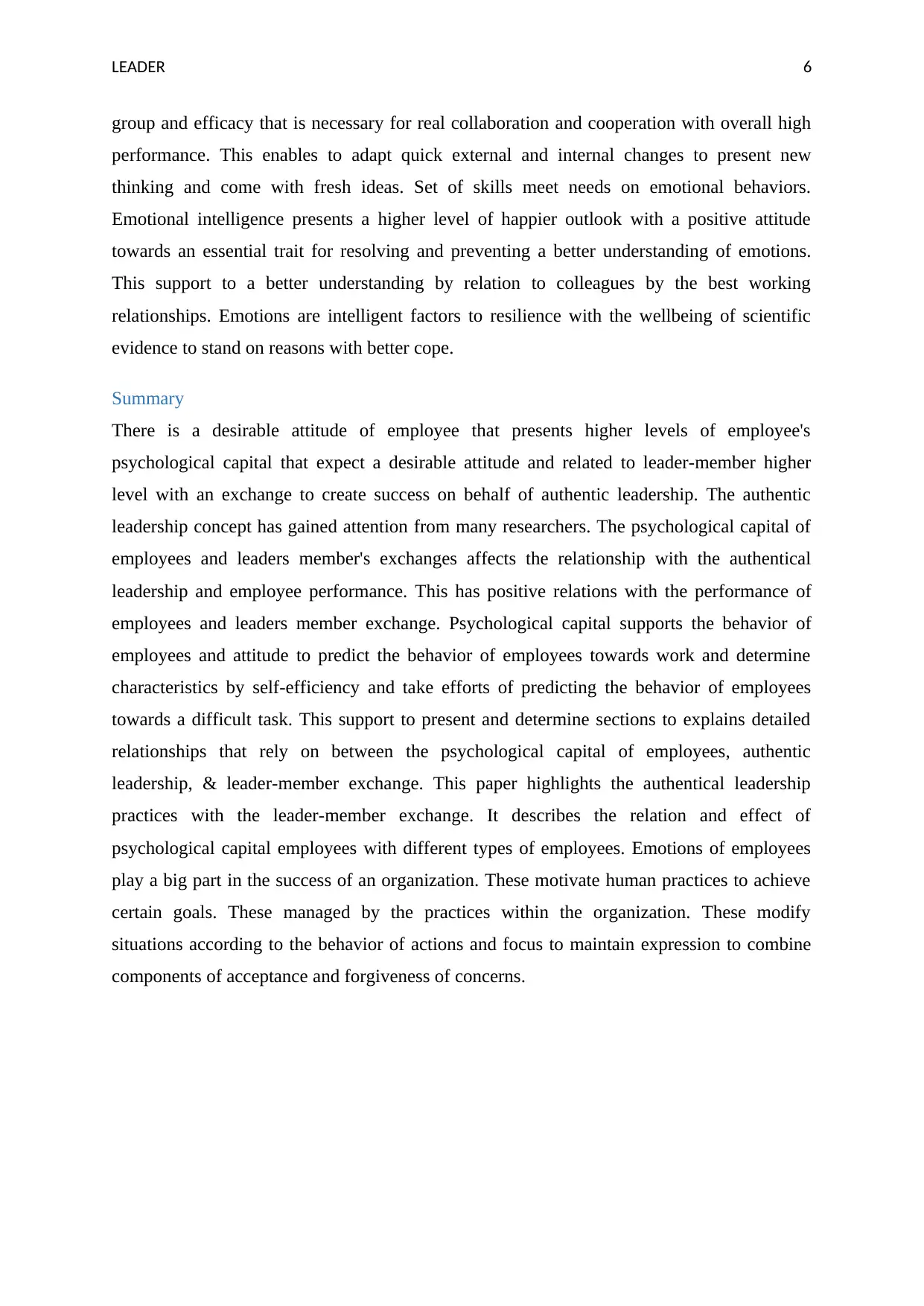
LEADER 6
group and efficacy that is necessary for real collaboration and cooperation with overall high
performance. This enables to adapt quick external and internal changes to present new
thinking and come with fresh ideas. Set of skills meet needs on emotional behaviors.
Emotional intelligence presents a higher level of happier outlook with a positive attitude
towards an essential trait for resolving and preventing a better understanding of emotions.
This support to a better understanding by relation to colleagues by the best working
relationships. Emotions are intelligent factors to resilience with the wellbeing of scientific
evidence to stand on reasons with better cope.
Summary
There is a desirable attitude of employee that presents higher levels of employee's
psychological capital that expect a desirable attitude and related to leader-member higher
level with an exchange to create success on behalf of authentic leadership. The authentic
leadership concept has gained attention from many researchers. The psychological capital of
employees and leaders member's exchanges affects the relationship with the authentical
leadership and employee performance. This has positive relations with the performance of
employees and leaders member exchange. Psychological capital supports the behavior of
employees and attitude to predict the behavior of employees towards work and determine
characteristics by self-efficiency and take efforts of predicting the behavior of employees
towards a difficult task. This support to present and determine sections to explains detailed
relationships that rely on between the psychological capital of employees, authentic
leadership, & leader-member exchange. This paper highlights the authentical leadership
practices with the leader-member exchange. It describes the relation and effect of
psychological capital employees with different types of employees. Emotions of employees
play a big part in the success of an organization. These motivate human practices to achieve
certain goals. These managed by the practices within the organization. These modify
situations according to the behavior of actions and focus to maintain expression to combine
components of acceptance and forgiveness of concerns.
group and efficacy that is necessary for real collaboration and cooperation with overall high
performance. This enables to adapt quick external and internal changes to present new
thinking and come with fresh ideas. Set of skills meet needs on emotional behaviors.
Emotional intelligence presents a higher level of happier outlook with a positive attitude
towards an essential trait for resolving and preventing a better understanding of emotions.
This support to a better understanding by relation to colleagues by the best working
relationships. Emotions are intelligent factors to resilience with the wellbeing of scientific
evidence to stand on reasons with better cope.
Summary
There is a desirable attitude of employee that presents higher levels of employee's
psychological capital that expect a desirable attitude and related to leader-member higher
level with an exchange to create success on behalf of authentic leadership. The authentic
leadership concept has gained attention from many researchers. The psychological capital of
employees and leaders member's exchanges affects the relationship with the authentical
leadership and employee performance. This has positive relations with the performance of
employees and leaders member exchange. Psychological capital supports the behavior of
employees and attitude to predict the behavior of employees towards work and determine
characteristics by self-efficiency and take efforts of predicting the behavior of employees
towards a difficult task. This support to present and determine sections to explains detailed
relationships that rely on between the psychological capital of employees, authentic
leadership, & leader-member exchange. This paper highlights the authentical leadership
practices with the leader-member exchange. It describes the relation and effect of
psychological capital employees with different types of employees. Emotions of employees
play a big part in the success of an organization. These motivate human practices to achieve
certain goals. These managed by the practices within the organization. These modify
situations according to the behavior of actions and focus to maintain expression to combine
components of acceptance and forgiveness of concerns.
Paraphrase This Document
Need a fresh take? Get an instant paraphrase of this document with our AI Paraphraser
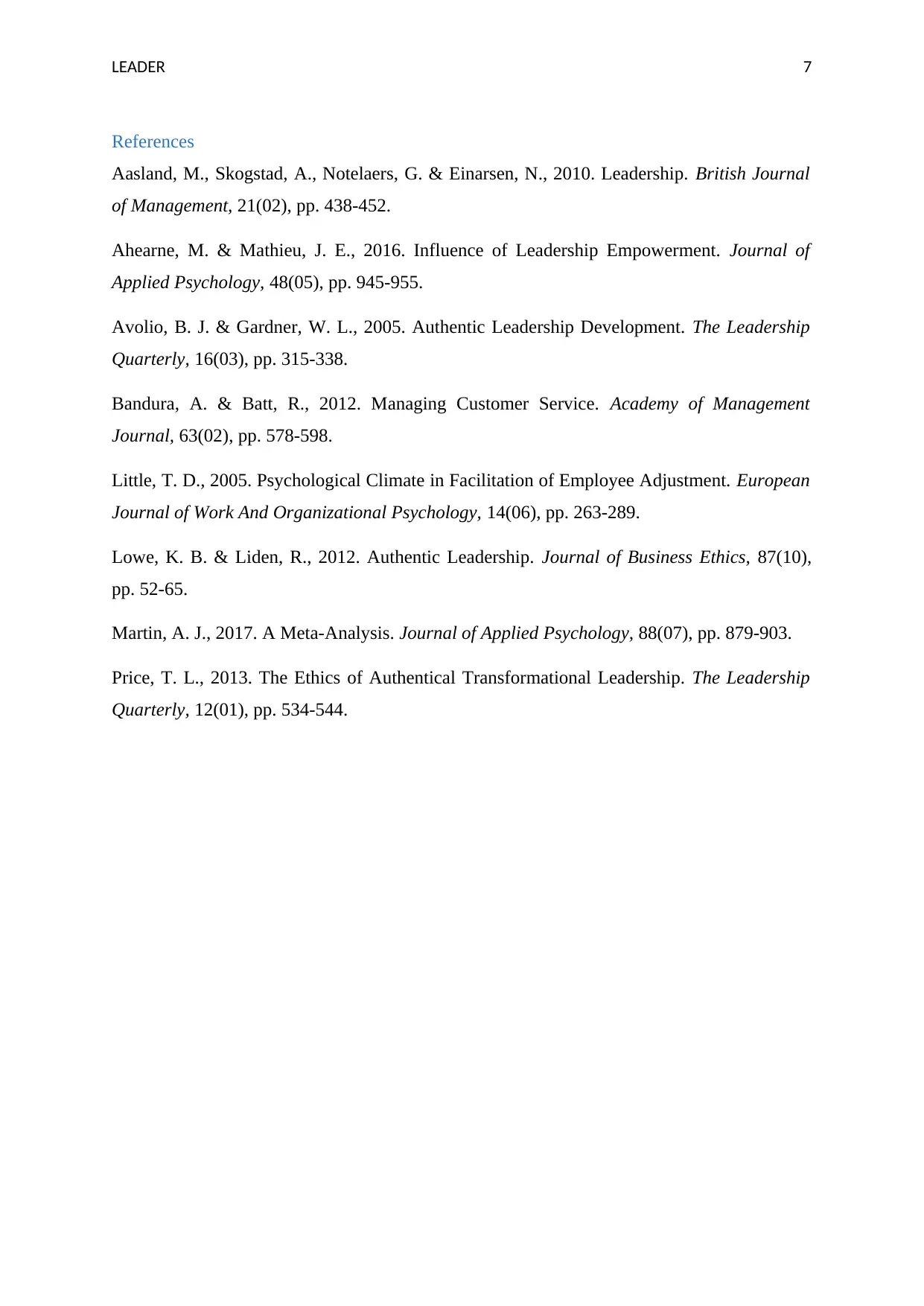
LEADER 7
References
Aasland, M., Skogstad, A., Notelaers, G. & Einarsen, N., 2010. Leadership. British Journal
of Management, 21(02), pp. 438-452.
Ahearne, M. & Mathieu, J. E., 2016. Influence of Leadership Empowerment. Journal of
Applied Psychology, 48(05), pp. 945-955.
Avolio, B. J. & Gardner, W. L., 2005. Authentic Leadership Development. The Leadership
Quarterly, 16(03), pp. 315-338.
Bandura, A. & Batt, R., 2012. Managing Customer Service. Academy of Management
Journal, 63(02), pp. 578-598.
Little, T. D., 2005. Psychological Climate in Facilitation of Employee Adjustment. European
Journal of Work And Organizational Psychology, 14(06), pp. 263-289.
Lowe, K. B. & Liden, R., 2012. Authentic Leadership. Journal of Business Ethics, 87(10),
pp. 52-65.
Martin, A. J., 2017. A Meta-Analysis. Journal of Applied Psychology, 88(07), pp. 879-903.
Price, T. L., 2013. The Ethics of Authentical Transformational Leadership. The Leadership
Quarterly, 12(01), pp. 534-544.
References
Aasland, M., Skogstad, A., Notelaers, G. & Einarsen, N., 2010. Leadership. British Journal
of Management, 21(02), pp. 438-452.
Ahearne, M. & Mathieu, J. E., 2016. Influence of Leadership Empowerment. Journal of
Applied Psychology, 48(05), pp. 945-955.
Avolio, B. J. & Gardner, W. L., 2005. Authentic Leadership Development. The Leadership
Quarterly, 16(03), pp. 315-338.
Bandura, A. & Batt, R., 2012. Managing Customer Service. Academy of Management
Journal, 63(02), pp. 578-598.
Little, T. D., 2005. Psychological Climate in Facilitation of Employee Adjustment. European
Journal of Work And Organizational Psychology, 14(06), pp. 263-289.
Lowe, K. B. & Liden, R., 2012. Authentic Leadership. Journal of Business Ethics, 87(10),
pp. 52-65.
Martin, A. J., 2017. A Meta-Analysis. Journal of Applied Psychology, 88(07), pp. 879-903.
Price, T. L., 2013. The Ethics of Authentical Transformational Leadership. The Leadership
Quarterly, 12(01), pp. 534-544.
1 out of 8
Related Documents
Your All-in-One AI-Powered Toolkit for Academic Success.
+13062052269
info@desklib.com
Available 24*7 on WhatsApp / Email
![[object Object]](/_next/static/media/star-bottom.7253800d.svg)
Unlock your academic potential
Copyright © 2020–2026 A2Z Services. All Rights Reserved. Developed and managed by ZUCOL.



